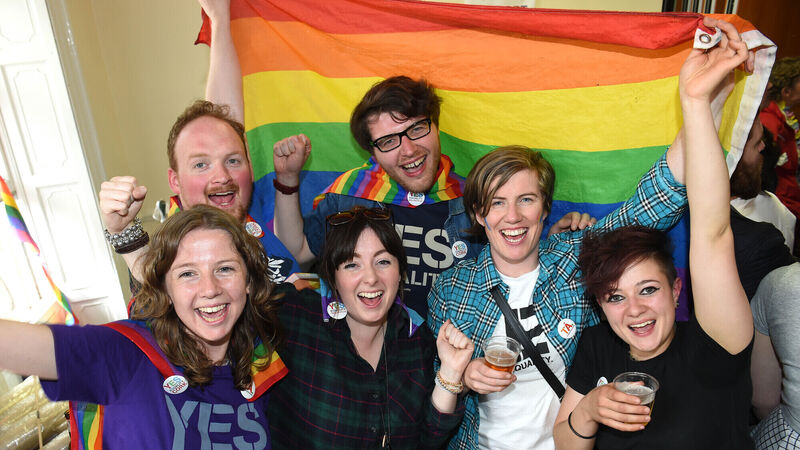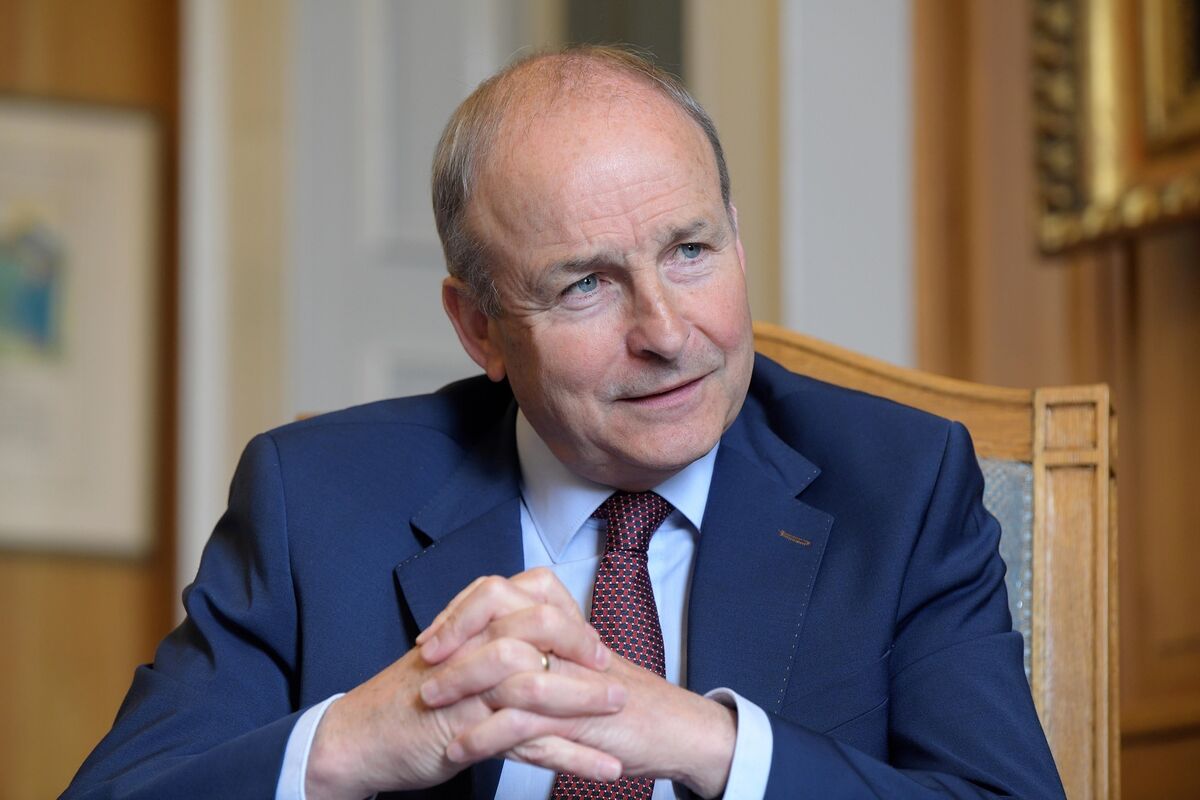Marriage equality: A good move for an equal society

Katie O’Brien, Niamh O’Leary, Breda Larkin, and Vera Stojanovic and (rear) Fergal MacCarthaigh and Harry Cullen enjoying the party at YES Equality Cork campaign HQ at North Mall, Cork, as the official referendum result was announced live from Dublin Castle. Picture: Larry Cummins
Ireland must hold fast to the decency and generosity that, a decade ago, gave the country marriage equality and the Gender Recognition Act, the Taoiseach has said.
Micheál Martin spoke to The Echo 10 years after Ireland became the first country in the world to legalise marriage equality by popular vote and, two months later, the fourth country to pass a law allowing the right to gender recognition based on self-declaration.
On Friday, May 22, 2015, the front page of the then Evening Echo had a story by Ann Murphy entitled ‘Battle for votes goes down to the wire’.
Yes campaigner Valerie Mulcahy of Yes Equality Cork said the poll was about giving everybody the opportunity to get married, whether they were gay or straight.
No campaigner Kathy Sinnott of First Families First said a Yes vote would “threaten all biological parents”.
Tellingly, we had a front page editorial entitled ‘Echo says YES’.
“This is not about ‘them’ and ‘us’,” we said. “If we vote Yes today, there will only be ‘us’.”
The next day, Saturday, we led with ‘Yes side on brink of historic win’, with Mary Smithwick writing that a turnout of up to 75% in Cork looked like the Yes side was heading for victory.

Monday’s paper said it all when the results for all the Cork constituencies had been tallied.
“South Central 66%, North Central 64%, East 62%, North West 58%, South West 56%.
‘YES YES YES YES YES!’
Self-declaration
The passage, on Wednesday, July 16, 2015, of the Gender Recognition Act, providing Irish people the legal right to gender recognition based on self-declaration, did not trouble our front page, or indeed any other page.
In our defence, the act’s passage does not appear to have been covered by the Irish Examiner, the Irish Independent, or The Irish Times either. Across the water, The Guardian covered the act’s passing, quoting Sara Phillips, then chair of Transgender Equality Network Ireland (Teni).
“This legislation marks an incredible shift in Irish society,” Ms Phillips said.
“This is an historic moment for the trans community in Ireland. Trans people should be the experts of our own gender identity. Self-determination is at the core of our human rights.”
It is safe to say, though, that if the legislation did indeed mark a shift in Irish society, it was one which appears to have gone, at the time, broadly uncommented. Marriage equality, on the other hand, was a phenomenon which captured the political and cultural imagination.
Fianna Fáil, the party founded by Éamon de Valera in 1926, might never have seemed an obvious champion of marriage equality, and indeed it was the Labour Party did that most of the early heavy lifting.
For all of that, though, Fianna Fáil’s leader, Micheál Martin, had joined calls for a referendum on marriage equality as far back as 2012, needling Enda Kenny, then taoiseach, on the issue.
Tormented
He memorably tormented the Fine Gael leader about one occasion in July 2012 when, avoiding questions from TV3’s Ursula Halligan about a possible referendum outside the National Library, the taoiseach had almost fallen over a flowerpot. The incident became a minor controversy — even gaining a ‘gate’ to become ‘flowerpotgate’.
Mr Kenny would change his mind about the referendum, and in Christmas 2014 joined Cork’s Jerry Buttimer for a drink in Panti Bar. A month later when Leo Varadkar, then health minister, told Mr Kenny he was planning on announcing that he was gay, the taoiseach was delighted to point out that he had visited Panti Bar before Mr Varadkar could.
The referendum ultimately passed by 62% of the electorate, enshrined marriage equality in the constitution. Ireland passed the Gender Recognition Act in July 2015, providing Irish people the legal right to gender recognition based on self-declaration.
In June of 2022, when Micheál Martin was taoiseach for the first time, he said he had “no time” for a “toxic discussion” about trans people.
“I’d be very concerned about that and I’ve watched it in the UK and we certainly don’t need that kind of debate in Ireland,” he told the LGBTQ+ group NFX at the time.
Last month, the UK Supreme Court ruled that the legal definition of a woman is based on biological sex, a decision which is likely to have far-reaching consequences for Britain’s trans community.
Positive milestones
Speaking to The Echo last week, Mr Martin said marriage equality and the Gender Recognition Act had both been positive milestones in Irish life.

“They were both very good acts and we should hold fast to them, they represented a very significant progress in Ireland, and they reflected a nation and society that understood the complexity of life, that understood there’s a lot of grey between the black and the white,” Mr Martin said.
“There’s nuance. I’m not an absolutist on anything, and in that sense I have always had a problem with fundamentalism and absolutism.
“But I’m also very conscious of the journeys that young people go through in life, particularly young people, particularly in the gender area.
“We should always be conscious of the impact of our comments, particularly in public debate, on the individual that may be going through a very lonely journey, in adolescence or going through second level school.”
He said he had been speaking recently with Government chief whip Mary Butler who also serves as minister of state with responsibility for mental health.
Support
“One of the higher incidences of self-harm is amongst the transgender community, and that speaks for itself.
“People in that community need support, they don’t need demonising, negative rhetoric on social media, they don’t need a culture war.
“Certainly there are issues, and people have genuine concerns, I accept that fully, but we need to have an intelligent, mature debate, talking to families impacted, talking to experts in the field in the medical world and psychology, we need to hear different views and perspectives, but we need to hear it in a respectful way, not in a provocative or dismissive way,” Mr Martin said.
“We have to be careful, and that’s what informs my view on this.”
Under assault
A decade after Ireland’s marriage equality referendum, hard-won LGBTQ+ rights are under assault all over the world.
Here, marriage equality for most people is now a mostly unremarkable fact of life.
However, challenges remain, and there are those who believe Ireland took a wrong turn 10 years ago with marriage equality, and with gender recognition.
Others have what Mr Martin calls genuine concerns, especially about gender recognition.
Separately, a tiny but very loud minority has spread a message of homophobia and transphobia across the country, often twinned with extreme anti-immigrant rhetoric, and sometimes accompanied by acts of intimidation and physical violence.
That message has not yet gained the sort of traction needed to make any significant electoral inroads, but many LGBTQ+ people have reported a significant rise in hate crimes, and many say they feel frightened for their safety.
That sunshine day in May, a decade ago at Dublin Castle and all around the country, when it seemed the whole world smiled for Ireland, remains still a snapshot of optimism and joy, but sometimes that bright day of hope seems a very long time ago.







 App?
App?


